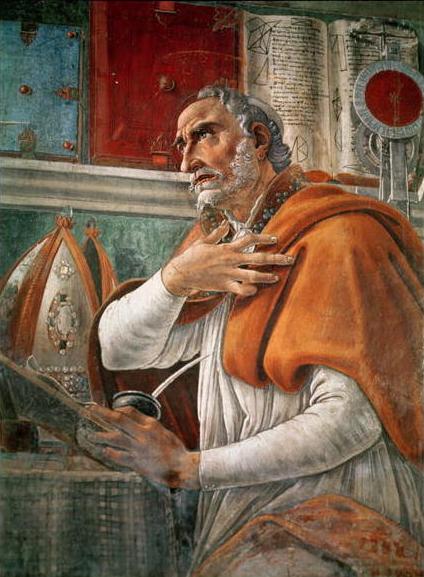
Augustine on the Law
I am currently reading On the Spirit and the Letter with students. He says much about the Law in various places in his writings. But here (chapter 23) he says:
"The apostle seems to rebuke and correct those who were persuaded to receive circumcision in that by the term “law” he refers to circumcision and other such observances of the law. Christians do not now observe them, since they were foreshadowings of what was to come. And they now actually possess what was promised symbolically through those foreshadowings."
He then goes on to say:
"The apostle, nonetheless, wanted us to understand that the law, by which he says that no one is justified, is found not only in those sacraments which they had as symbols of what was promised, but also in those works which amount to a righteous life for whoever does them."
- Details
- Category: Recommended Reading Recommended Reading
- Published: 30 September 2015 30 September 2015
- Hits: 2569 2569
Sweating when Reading Augustine

I am enjoying taking a Latin class with the Davenant Institute. It is a very good class. I recommend these folks if you are wanting to work on your Latin. This week's translation exercise is a selection from Bonaventure's De reductione artium ad theologiam (On the Reduction of the Arts to Theology).
In this selection Bonaventure (1221-1274) is making some reading and study recommendations. He writes:
"Circa primum insudare debet studium doctorum".
I learned that "circa" means "around". But it can also mean "concerning", which makes more sense here. "Primus, Prima, Primum" is an adjective, in particular here an ordinal number: "first". So we start with something like "concerning first", or "concerning the first". [NOTE: In my original post I then said: 'We might smooth this out and bring into our own idiom with something like "first of all" (although I like starting with a more "wooden" translation first to make sure I am grasping the grammar)'. Now that I have worked through the passage a second time, it seems like something like "concerning the first" is better. This is because Bonaventure is referring to the "first" of several things he has just listed-]. "Debet" is the main verb: "he/she/it ought"--here probably "one ought". This is followed by "insudare", which is an infinitive: "to . . . ." When I looked up the verb I chuckled, the verb "insudare" means "to sweat". Then "studium doctorum" is straightforward: "the study of the doctors". The preeminent "doctor", as Bonaventure sees it, is Augustine. So we end up with something like:
"Concerning the first, one ought to sweat the study of the doctors".
One might be tempted to sanitize "sweat" a bit (pun intended). But the basic imagery of "sweat" is probably a good one. If one wants to understand the great church fathers (=the "doctors") it takes some sweat. It takes work. We indeed ought to sweat it out in trying to understand the great doctors of the church. Theological study is a work out. Put on your sweats, get hydrated, and get to work.
- Details
- Category: Recommended Reading Recommended Reading
- Published: 22 September 2015 22 September 2015
- Hits: 2396 2396
Albert Camus, Revolt, and the Garden
I am enjoying reading Albert Camus. Over a year and a half ago I decided to engage Edmund Husserl. I read Crisis of the European Sciences. I took my time, and read it slowly and carefully. In trying to understand Husserl, this has lead to try and understand the existentialists who flow from (Husserl's) phenomenological tradition—largely for my purposes Jean Paul Sartre and Albert Camus. I have enjoyed Camus immensely.
Currently I am reading The Myth of Sisyphus and Other Essays. For Camus life is fundamentally absurd. The absurd is essentially what we find when two things meet: (1) The mind that desires unity/coherence/meaning meets (2) the world that disappoints; or (1) one’s nostalgia for unity meets (2) the fragmented universe. In short, we are faced with absurdity when man and his desire for truth, unity, etc., encounters a universe which in no way gives evidence of truth, beauty, ultimate meaning, coherence, etc.
Camus sets up his option against two others. Thus, when faced with the absurd one should not (1) with Kierkegaard, take a “leap” against reason, or in spite of reason into the Christian faith; nor should one (2) with Edmund Husserl embrace a form of reason/knowledge which claims too much—i.e., where reason/knowledge is able to achieve almost absolute and divine-like success [these are Camus’ summary of Kierkegaard and Husserl]. In contradistinction to these two options, the truly courageous must simply face the absurdity of life.
The answer for Camus is to face the absurdity of life. We are to engage in “permanent revolution,” “revolt,” “defiance” (pp. 54-55). We engage in “revolution,” “revolt,” and “defiance” by refusing the Kierkegaardian or Husserlian options (again, as Camus understands them), and by persisting in living our lives knowing full well that all is absurd.
Having read all of this, it was then fascinating to see him say of such “revolt”: “That revolt gives life its value. Spread out over the whole length of life, it restores its majesty to that life” (p. 55).
A basic thought: Even though Camus is self-consciously rejecting a Christian understanding of man, he nonetheless (unknowingly, I presume) slips into a type of Christian language about man. Adam in the garden was given a command to rule, subdue, and exercise dominion over the garden (and by extension, the world) (Genesis 1:26ff.). He was also placed in the garden and told “to work” and “to keep” the garden (Gen. 2:15). In short, as God’s representative man was to function as kingly figure. For Camus, man is a “kingly” (his majesty is restored) when he engages in revolt. For historic Christianity, man is “kingly” when he engages in faith-filled obedience, as fleshed out in exercising dominion. It is good to see Camus (even if unknowingly) stumble upon Christian categories in speaking about man. I suspect such categories are hard to avoid.
Note: I am working from The 1983 Vintage International version of The Myth of Sisyphus.
- Details
- Category: Recommended Reading Recommended Reading
- Published: 18 September 2015 18 September 2015
- Hits: 2591 2591
More on the Opening Lines of Augustine's De Trinitate
I read the opening lines of Augustine's De Trinitate today. I was struck. So much is loaded into this opening paragraph. Here is what Augustine writes.
The reader of these reflections of mine on the Trinity should bear in mind that my pen is on the watch against the sophistries of those who scorn the starting-point of faith, and allow themselves to be deceived through an unseasonable and misguided love of reason.
Note that Augustine is not the least concerned about starting on a polemical note. He is happy to engage in polemics. His pen "is on the watch". Augustine has in mind the "sophistries of those who scorn the starting-point of faith . . ." Here is Augustine's "faith seeking understanding". He clearly starts with faith (or claims to--this is certainly a larger discussion). These persons err in allowing themselves "to be deceived through an unseasonable and misguied love of reason". So much: our "unseasonable" and "misguided" love(s). And these disordered loves cause some persons to not make appropriate use of reason. Augustine is not denigrating reason, but apparently or more likely is speaking of reason when it is not ordered the way it ought to be ordered. And this dis-ordered approach to, and mis-appropriation of, reason is linked do (caused by?) not embracing the starting point of faith.
Augustine continues . . .
Some of them try to transfer what they have observed about bodily things to incorporeal and spiritual things, which they would measure by the standard of what they experience through the senses of the body or learn by natural human intelligence, lively application, and technical skill. There are others whose concept of God, such as it is, ascribes to him the nature and moods of the human spirit, a mistake which ties their arguments about God to distorted and misleading rules of interpretation. Again, there is another type; people who indeed strive to climb above the created universe, so ineluctably subject to change, and raise their regard to the unchanging substance which is God. But so top-heavy are they with the load of their mortality, that what they do not know they wish to give the impression of knowing, and what they wish to know they cannot; and so they block their own road to genuine understanding by asserting too categorically their own presumptuous opinions, and then rather than change a misconceived opinion they have defended, they prefer to leave it uncorrected.
One comment here. Toward the end Augustine can write: ". . . and so they block their own road to genuine understanding by asserting too categorically their own presumptuous opinions . . . " Throughout De Trinitate Augustine will work through the danger of not approaching God on God's terms. We must indeed be on the watch for "presumptuous opinions," and for the pride which tempts us to refuse to correct a "misconceived opinion."
- Details
- Category: Recommended Reading Recommended Reading
- Published: 17 September 2015 17 September 2015
- Hits: 2473 2473
Augustine's First Lines from "The Trinity"

In my "Doctrine of God" class we will soon start reading Augustine's De Trinitate. I am looking forward to reading through it with the students. I read the opening section today, and was struck by how wonderfully Augustine begins his treatise. Here are the opening lines:
The reader of these reflections of mine on the Trinity should bear in mind that my pen is on the watch against the sophistries of those who scorn the starting-point of faith, and allow themselves to be deceived through an unseasonable and misguided love of reason. Some of them try to transfer what they have observed about bodily things to incorporeal and spiritual things, which they would measure by the standard of what they experience through the senses of the body or learn by natural human intelligence, lively application, and technical skill. There are others whose concept of God, such as it is, ascribes to him the nature and moods of the human spirit, a mistake which ties their arguments about God to distorted and misleading rules of interpretation. Again, there is another type; people who indeed strive to climb above the created universe, so ineluctably subject to change, and raise their regard to the unchanging substance which is God. But so top-heavy are they with the load of their mortality, that what they do not know they wish to give the impression of knowing, and what they wish to know they cannot; and so they block their own road to genuine understanding by asserting too categorically their own presumptuous opinions, and then rather than change a misconceived opinion they have defended, they prefer to leave it uncorrected.
With such a beginning, you know you are in for a real treat!
- Details
- Category: Recommended Reading Recommended Reading
- Published: 16 September 2015 16 September 2015
- Hits: 2804 2804
Henri Blocher on the Trinity
Here is a video by Henri Blocher, giving a lecture on the Trinity at Moore College. The video is two lectures, Don Carson then Henri Blocher. Blocher's lecture starts about halfway through (about 1:13:50).
- Details
- Category: Recommended Reading Recommended Reading
- Published: 14 September 2015 14 September 2015
- Hits: 2427 2427